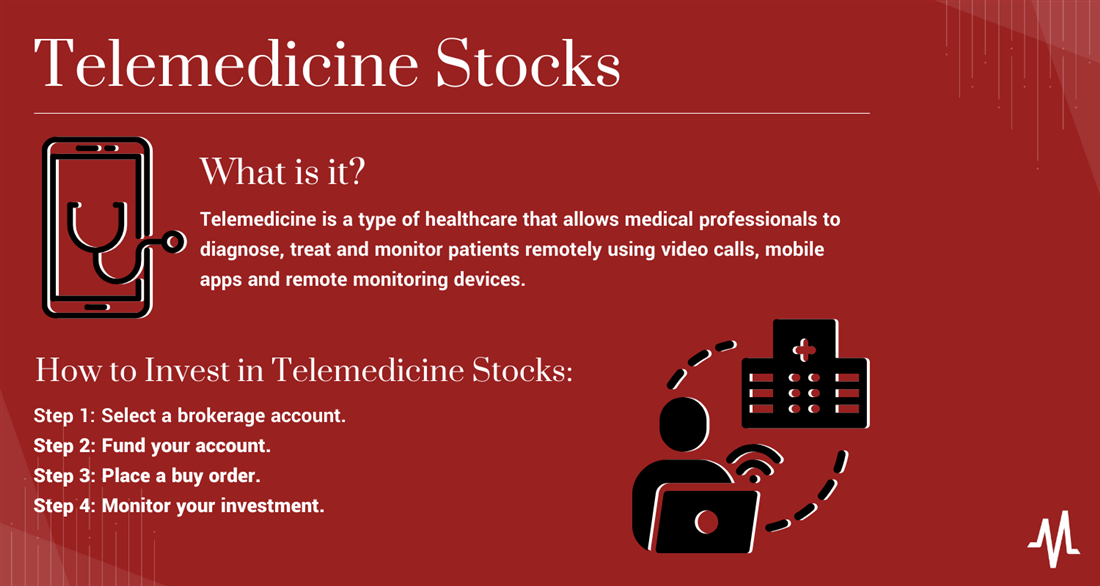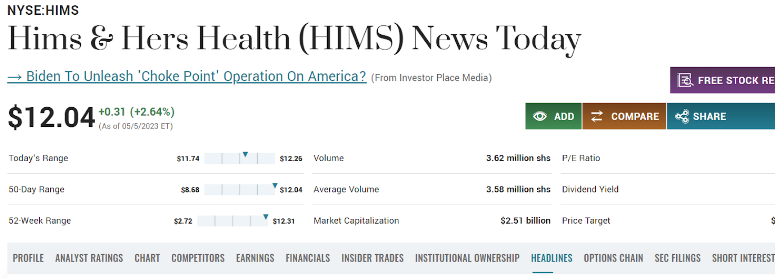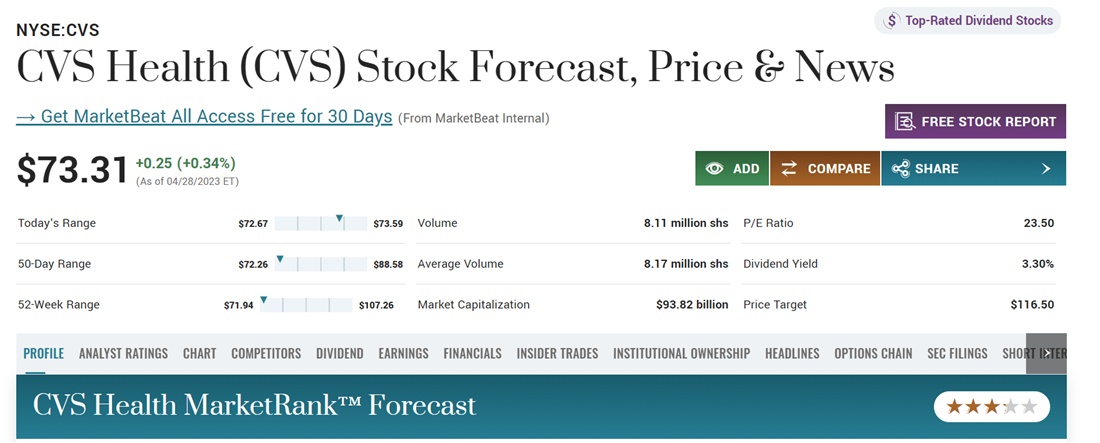
Coming into prominence during the COVID-19 pandemic, telemedicine stocks saw increases in price and profitability in the past five years. As relaxed government regulations allowed service providers to offer an enhanced range of virtual assistance offerings, investors soon became interested in telemedicine companies stocks.
Interested in learning more about how to invest in virtual healthcare and telehealth? Read on to learn more about the best telemedicine stocks and how these companies provide value to customers and investors.
Overview of Telehealth and Telemedicine
Telemedicine is a type of healthcare that allows medical professionals to diagnose, treat and monitor patients remotely using video calls, mobile apps and remote monitoring devices.
It allows patients to receive medical care from the comfort of their own homes or remote locations, which can be particularly useful for individuals living in rural areas or with disabilities that make mobility more difficult. An example of telemedicine services could include a psychiatrist meeting with a patient and refilling a prescription using video chat services rather than a physical appointment.
Telemedicine services have become increasingly popular in recent years, particularly due to the COVID-19 pandemic. The highly-contagious nature of the pandemic forced medical providers to avoid in-person consultation, directly leading to increases in telemedicine companies' stock prices. Governments around the globe also responded to the infectivity of the virus by relaxing regulations around the use of telemedicine, leading to its expansion.
Why Invest in Telemedicine?
Investing in telemedicine offers investors unique exposure to the rapidly-changing healthcare sector. Many government regulations relaxed during COVID-19 are still in place around the globe, meaning telemedicine is likely to be more than a passing phase.
COVID-19 has also shown the importance of telehealth services in remote areas, improving patient-provider relationships through more frequent monitoring and follow-ups. These factors can potentially produce returns for investors with exposure to stocks from MarketBeat's best medical stocks list using telemedicine services.

How to Invest in Telemedicine Stocks
Now that you understand how telehealth stocks work, you can begin considering your investment options. The following are the basic steps you'll go through when investing in some of the best telehealth and top-rated biotech stocks on MarketBeat.
Step 1: Select a brokerage account.
If you still need to get a brokerage account, you'll need to open one before you can start buying and selling items from Marketbeat's best medical stocks list. Consider factors like account minimums, trading tools and market availability when selecting a broker to work with. MarketBeat's list of the top brokers can be a great place to start your research if this is your first time opening a trading account.
Step 2: Fund your account.
After submitting your personal information, your broker will approve and open your account. You'll usually link and confirm your funding method before accessing full account functionality. Depending on the broker you're working with, you can fund your account using a direct bank transfer, wire transfer or debit card.
Step 3: Place a buy order.
Once your account is open and funded, you can begin exploring stock options on the markets your broker offers. In later sections, we'll cover a few of the top telemedicine stock players, but you may also want to explore the best pharmaceutical stocks on MarketBeat before investing.
After selecting a company to invest in, search for its telehealth stock symbol using your brokerage account and place a buy order. Novice investors may want to use their brokerage account's limit order functionality to lock in their telehealth stock price paid per share when the order closes.
Step 4: Monitor your investment.
If your broker can close the order according to your instructions, you'll see the shares in your account. Be sure to keep an eye on the value of your investments and how they're changing to reach your financial goals.
Top Telehealth and Telemedicine Stocks to Buy
Now that you have a functional account, it's time to explore the best telehealth and telemedicine stock options available in major markets.
Teladoc Health
Teladoc Health Inc. (NYSE: TDOC) provides telemedicine services, including virtual visits with doctors and specialists, mental health counseling and chronic condition management. Their platform connects patients with licensed healthcare providers through phone, video or mobile app, allowing patients to receive medical care from the comfort of their own home.
Teladoc Health has experienced significant growth in recent years, and its services are now available to patients in over 175 countries. In 2020, the company announced plans to merge with Livongo Health, a leading provider of digital health management solutions for chronic conditions. The merger was completed in 2020, creating a combined company that provides virtual care, remote monitoring and personalized health management services.
Hims & Hers Health
Hims & Hers Health Inc. (NYSE: HIMS) is a telemedicine company that offers virtual consultations and prescriptions for various health and wellness issues, ranging from erectile dysfunction to acne. Patients can sign up for the service online and complete a medical questionnaire. They get matched with a licensed healthcare provider who can diagnose and prescribe medications if necessary.
Hims & Hers was founded as a direct-to-consumer telemedicine company. Investors looking for native options may want to consider Hims & Hers. In May 2023, the company showcased a total market capitalization of more than $2.5 billion.

CVS Health
CVS Health Co. (NYSE: CVS) is best known as a drugstore and pharmacy service provider — you might even pick up your prescriptions in person at this giant. However, it has also made multiple strides in its telemedicine services since 2020. The company's telehealth services, offered through its subsidiary, MinuteClinic, provide virtual consultations and in-person care for primary, urgent and specialty care services.
In addition to its telehealth services, CVS Health has invested in digital health and remote patient monitoring. The company's HealthHUB locations offer various health and wellness services, including virtual consultations with healthcare providers, chronic condition management, and remote patient monitoring. The HealthHUBs provide patients with personalized care that is convenient, accessible and affordable. If you're an investor looking for a blue-chip potential stock purchase, CVS could be a stronger choice. 
UnitedHealth Group
Another major name in healthcare, UnitedHealth Group (NYSE: UNH) has been investigating how to add telemedicine to the list of benefits its policyholders enjoy. UnitedHealthcare now offers various telemedicine services to its members, including virtual consultations with doctors and remote monitoring for patients with chronic conditions.
In addition to offering telemedicine services to its members, UnitedHealthcare has also launched its telemedicine platform called "24/7 Virtual Visits." Virtual Visits allow members to connect with healthcare providers for virtual consultations through a HIPAA-compliant mobile app or website. The platform provides convenient and safe healthcare access, even in areas where UnitedHealth does not operate.
GoodRx
GoodRx Holdings Inc. (NASDAQ: GDRX) is a tech-forward company that helps consumers compare drug prices and save money. GoodRx's team partners with pharmaceutical providers and health insurance providers to offer lower rates on prescription medications. GoodRx is not a telemedicine company, but its platform can be seen as complementary to telemedicine services, as both aim to provide consumers with greater access to affordable health services.

Doximity
A persistent concern of telemedicine is HIPAA compliance and patient information confidentiality. Medical professionals increasingly demand secure software to share sensitive patient information and collaborate with other care providers. Doximity Inc. (NASDAQ: DOCS) is an online messaging service provider that provides medical professionals with enhanced security when transmitting and storing patient data. It provides secure messaging, electronic faxing and video chat services.
Pros and Cons of Investing in Telemedicine
Before continuing to explore telemedicine investing options and the best pharmaceutical stocks on MarketBeat, consider both the pros and cons of investing in this healthcare realm.
Pros
Telemedicine is a rapidly growing market that should continue to expand in the coming years, offering opportunities for investors.
- New developments and market expansion: While COVID-19 proved the power of telemedicine, the cost-saving benefits and improved convenience for consumers may compound demand for these services from health insurance and care providers.
- Increased access to healthcare: Telemedicine can be used to improve access to healthcare services for patients who live in remote areas. It may offer future expansion potential for companies heavily invested in remote care services, especially when combined with relaxed regulations.
- Improved patient-provider relationships: The convenience of telemedicine services can make it easier for patients and service providers to connect and review test results, feedback and more. It may lead to improved patient health service outcomes and stronger investor returns.
Cons
While the convenience of modern technology is a major benefit to both patients and care providers, it comes with security and confidentiality compliance challenges.
- Privacy and security concerns: Telemedicine involves transmitting sensitive patient information, and there are concerns about the security of electronic medical records and the potential for data breaches. Poor cybersecurity could lead to a costly lawsuit for publicly-traded companies, resulting in investor loss.
- Technical problems: Telemedicine relies on technology, and technical issues such as connectivity problems or software glitches can disrupt the delivery of care and potentially impact patient outcomes. This may be a particularly persistent problem in rural areas, where telemedicine is most needed.
Investing in the Future of Telemedicine
When considering the future of telemedicine and its potential, keep the healthcare industry's regulatory structure in mind. While technology has infiltrated every area of our daily life, ranging from dating to completing work tasks, telemedicine, by definition, requires sharing patient health information over a virtual communication network.
Telemedicine can leave investors liable for losses in a major data breach or client information loss. Be sure to review security protocols before making a major investment in a telemedicine-focused company.
FAQs
Ready to learn more about the best pharmaceutical stocks in 2023? The following are some last-minute questions that you might have about telehealth stocks.
What is the best telehealth stock to buy?
The best telehealth stock to buy might vary depending on your investment goals. For example, if you're looking for a native telemedicine stock, Hims & Hers Health could be a great option. If you're a long-term investor looking for blue-chip, established investment options, CVS could be a better choice.
Is telemedicine a good investment?
Investing in telemedicine can be a good idea for some investors, especially those interested in growth. Telemedicine may remain an important component of the world's healthcare infrastructure, leading to rising stock prices. However, it's important to know that no investment opportunity offers guaranteed returns, especially when investing in a single company's shares of stock.
Who is the biggest telemedicine company?
Teladoc Health is currently the largest telemedicine-focused company, with a total market capitalization of over $4 billion as of May 2023.




